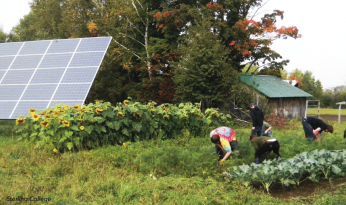Intermediate Ends
Food & Energy Stories
Vermonters know their farmers. The state is first in the nation for number of Community Supported Agriculture (CSA) operations per capita. The CSA model allows consumers to pre-purchase regular shares of veggies, fruit, meat, and even milk and eggs from their local farmers.
While direct sales of Vermont produce through CSAs and farmers markets grew 139% between 2002 and 2007, there is still great potential to increase local food production and consumption.12
Communities powering energy transitions
Over half of Vermont’s towns have established energy committees and are coordinating their actions through a statewide coalition. Some have also voted to approve PACE, a new financing mechanism that allows town loans for energy improvements to be paid back via property taxes.
Community projects are taking off, too. A solar garden in Putney, investments to make Rutland New England’s solar capital, woodchip heating at an affordable housing complex in Barre: all are building Vermont’s energy security.
 Adding value with tech-savvy: adding value to milk normally happens through bottling or making cheese. But in Hardwick, the heart of Vermont’s food renaissance, Vermont Natural Coatings turns whey, a byproduct of cheese making, into non-toxic finishes for wooden floors. This diversification of manufacturing is reshaping Vermont’s food system.
Adding value with tech-savvy: adding value to milk normally happens through bottling or making cheese. But in Hardwick, the heart of Vermont’s food renaissance, Vermont Natural Coatings turns whey, a byproduct of cheese making, into non-toxic finishes for wooden floors. This diversification of manufacturing is reshaping Vermont’s food system.
[one_third]
Cost of fossil fuels imported for heating in 2010: 13
$600 million
[/one_third]
[one_third]
New jobs a 5% increase in local food output would create over 10 years: 14
1,700
[/one_third]
[one_third_last]
Children in Vermont who are food insecure: 15
19%
[/one_third_last]






